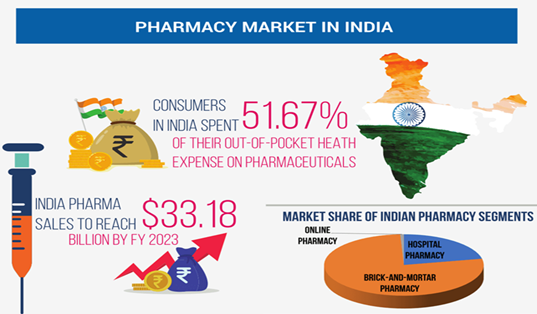Governance
Context: All-India Organisation of Chemists and Druggists threatens a country-wide agitation against e-pharmacies.
- Recently, the Ministry of Health has pulled up at least 20 companies including Tata-1mg, Flipkart, Apollo, PharmEasy, Amazon and Reliance Netmeds, by issuing them a show cause notice, for selling medicines online.
About E-Pharmacy:

- E-pharmacy, or online pharmacy, refers to a platform that allows customers to purchase medicines and other healthcare products online.
- E-pharmacies operate through websites or mobile apps where users can upload their prescriptions, select the products they need, and place orders.
- The products are then delivered to the customers’ doorstep leading to such mode becoming increasingly popular due to their convenience, accessibility, and cost-effectiveness.
- However, they also pose regulatory challenges and concerns related to the safety, authenticity, and quality of medicines sold online.
Draft e-pharmacy rules:
- The draft e-pharmacy rules were introduced in 2018, and were intended to whip e-pharmacy businesses into shape, but were shoved into cold storage.
- E-pharmacies made a bang in the market in 2015 by offering hefty discounts on medicines and calling themselves facilitators of doorstep delivery.
- However, companies like PharmEasy are building a supply chain from the ground up by buying out big and small wholesale drug distributors.
- Since 2015, e-pharmacies have recorded losses year-on-year. Tata-1 Mg posted a loss of ?146 crore in FY22, whereas PharmEasy’s losses widened to ?2,700 crore in the same fiscal.
- Both e-pharmacies and offline retail pharmacists have realized that it is futile to stick to any one way of doing business.
Associated concerns:
- The Centre is of the view that online sale of drugs without a doctor’s prescription or even otherwise, poses threats to the public health including drug abuse, especially among youth. Many instances of drug abuse, especially among youth have surfaced lately.
- It’s a great risk to national security as well as the online data can be misused for criminal activities by promoting addictive medicines.
- The government has been receiving various representations raising concerns regarding sale of drugs via online platforms in contravention to the Drugs and Cosmetics Act, 1940 & rules there under.
- Some drugs are also being sold online which are only allowed for sale by retail under a valid prescription of a registered medical practitioner and supplied under the supervision of a pharmacist.
- Not just adults, children too use the internet, and this may cause severe health hazards in case we don’t put a ban on online sales.
Significance
- E-pharmacies are a part of the government’s intent to build digital infrastructure as a key pillar driving India’s long-term growth strategy.
- The potential of India’s over $344 million e-pharmacy market is promising and is expected to grow at an enviable 40-45% owing to its surging internet connectivity, mobile phone penetration, government initiatives, and rising investments.
- E-pharmacies can provide access to affordable and genuine medicines, especially in areas where traditional pharmacies may not be accessible.
Associated challenges:
- The Centre is of the view that online sale of drugs without a doctor’s prescription or even otherwise, poses threats to the public health including drug abuse, especially among youth. Many instances of drug abuse, especially among youth have surfaced lately.
- It’s a great risk to national security as well as the online data can be misused for criminal activities by promoting addictive medicines.
- The government has been receiving various representations raising concerns regarding sale of drugs via online platforms in contravention to the Drugs and Cosmetics Act, 1940 & rules there under.
- Some drugs are also being sold online which are only allowed for sale by retail under a valid prescription of a registered medical practitioner and supplied under the supervision of a pharmacist.
- Not just adults, children too use the internet, and this may cause severe health hazards in case we don’t put a ban on online sales.
Laws regulating e-pharmacies:
- The Drugs Controller General of India (DCGI) first banned the online sale of medicines in 2015.
- The latest draft New Drugs, Medical Devices, and Cosmetics Bill, 2022, has comprehensive provisions including:
- Periodic inspections, complaint redressal mechanisms, monitoring e-pharmacies, and others.
- Indian regulations require that pharmacies, both online and offline, be registered with the central drugs regulator CDSCO and have permits from state regulators for sales and distribution.
- Previously, the Federation of Indian Chambers of Commerce and Industry developed a self-regulation code for e-pharmacies in 2016.
Way Forward:
In recent years, the market penetration of e-pharmacies has seen a growth from 3% to 5%. It is an important option for consumers for buying chronic care medicines for diabetes, high blood pressure, cardiac issues, and so on.
Hence, an outright ban on heaving e-pharmacies to the hellbox must be avoided. It goes against the government’s intent of building digital infrastructure as a key pillar driving India’s long-term growth strategy.
Therefore, It is crucial for the government and stakeholders to work together towards ensuring that e-pharmacies operate efficiently and legitimately, while protecting the health and safety of the public.
Source: The Hindu











